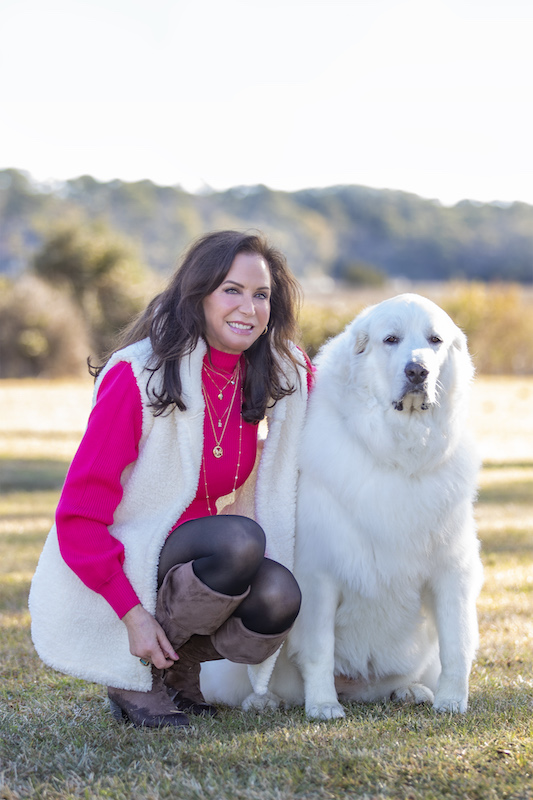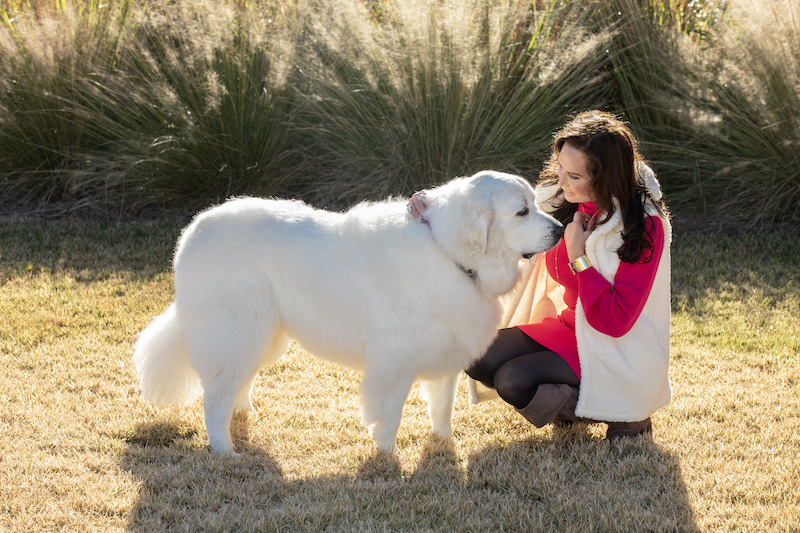
These days, it’s not uncommon to see all kinds of pets in all kinds of places. Recently, someone posted a picture of a couple of sunbathers on the beach lounging beside their pet duck who seemed to feel right at home. More and more hotels and restaurants are becoming pet friendly, and many eating establishments will happily prepare a chicken tender or offer up a bowl of ice cream for your pampered pup.
While our pets have long been considered family members, now pets are even eligible for qualification as therapy animals for patients in hospice and assisted living facilities. Pet therapy has been shown to improve patient satisfaction, energy levels, self-esteem, and mood, as well as decrease depression. Additional benefits include increased motor skills and movement, improved social skills and verbal communication, decreased boredom, and a more positive outlook.
Jennifer Rulli, dog owner/handler and volunteer with Hospice Care of the Lowcountry, does dog therapy work with Martina (“Marti”), her Great Pyrenees. The two of them have also worked at three assisted living homes and with Pockets Full of Sunshine, an organization that provides opportunities and connections for adults with special needs.
Rulli first began pet therapy with Marti at the suggestion of her sister who recognized the dog’s exceptional temperament. “My sister recommended that I bring Marti to Pockets Full of Sunshine, and when my family saw how great she was with the ‘Rays’ at Pockets, my dad recommended that I reach out to The Preston Health Center at Cypress where my grandmother was a resident,” Rulli said. “Eventually, we branched out to The Pines and to Seabrook as well.”
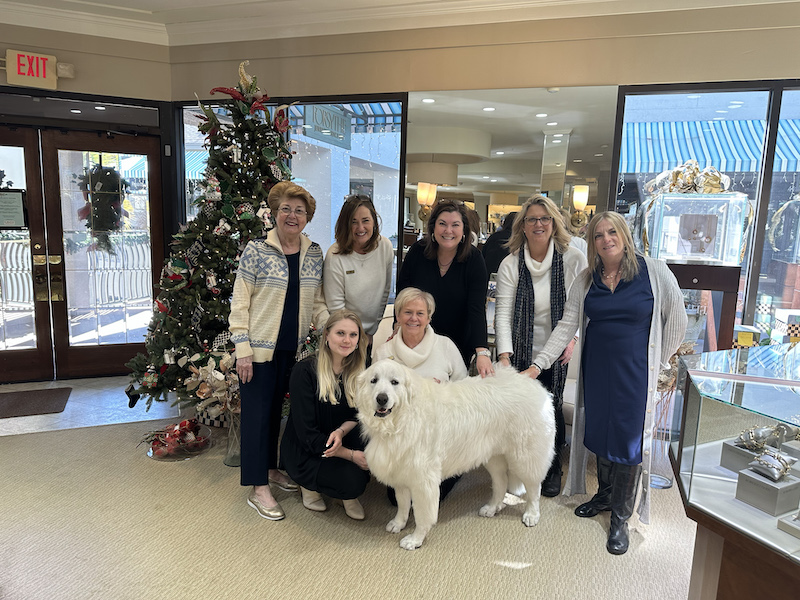
Once Rulli experienced the success that Marti was having with the assisted living residents, she made the decision to have her certified as a hospice therapy dog, a certification which requires training and the ability to pass certain tests of character. Therapy dogs must have attained adulthood, with many organizations not allowing puppies under a year old. Additionally, hospice therapy dogs are required to pass the American Kennel Club (AKC) Canine Good Citizen (CGC) test for obedience, which includes 10 specific tasks. These elements are extremely important when any therapy dog is in public; a dog who can’t “leave it” on cue or interact with children in a friendly manner will not succeed. Marti passed all 10 tasks with flying colors. The tasks are:
- Accepting a friendly stranger: This test demonstrates that the dog will allow a friendly stranger to approach it and speak to the handler in a natural, everyday situation.
- Sitting politely for petting: This test demonstrates that the dog will allow a friendly stranger to touch it while it is out with its handler.
- Appearance and grooming: This test demonstrates that the dog will welcome being groomed and examined and will permit someone, such as a veterinarian, groomer, or friend of the owner to do so. It also demonstrates the owner’s care, concern, and sense of responsibility.
- Out for a walk (walking on a loose lead): This test demonstrates that the handler is in control of the dog when the dog is walking on a leash.
- Walking through a crowd: This test demonstrates that the dog can move about politely in pedestrian traffic and is under control when on a leash in public.
- Sit and down on cue and stay in place: This test demonstrates that the dog has training, will respond to the handler’s cues to “sit” and “down” and will remain in place (sit or down position, whichever the handler prefers).
- Coming when called: This test demonstrates that the dog will come when called by the handler.
- Reaction to another dog: This test demonstrates that the dog can behave politely around other dogs.
- Reaction to distraction: This test demonstrates that the dog is always confident when faced with common distracting situations.
- Supervised separation: This test demonstrates that a dog can be left with a trusted person, if necessary, and will maintain training and good manners.
Perhaps even more impressive and interesting than Marti’s intelligence and compassion, though, is her back story—how she was found and rescued. Rulli was formerly the vice president of a dog rescue in Indiana. In January 2019, the rescue president, Rulli’s best friend, was out in a snowstorm in farm country when she happened to spot a pair of black eyes and black nose peeping out from a blanket of snow, barely visible.
“Marti was less than a year old at the time and had become tangled in barbed wire,” Rulli said. “My friend cut Marti out of the wire, put her in the vehicle, and took her back to the rescue. We looked for the owners on Lost Pets, but because she was underweight, with long nails and long, matted, dirty hair, we doubted anyone would claim her.”
The rescuers decided that even if someone claimed Marti, they would not release her due to the neglect. It was clear that Marti had wandered off, most likely because she thought she didn’t have a flock to guard, or her family didn’t give her enough attention. She was looking for her herd—her pack. Since no one claimed her, Marti stayed at the rescue where Rulli was working.
“She was happy as a clam there with the other dogs,” Rulli said. “I’d be cleaning kennels, and suddenly I’d feel this weight on my shoulders and see two big white paws on my back. ‘Oh, hi Martina!’”
Occasionally Rulli would bring Marti home with her for sleepovers with her other two Great Pyrenees mixes and Shih tzu. The pack got to know Marti and bonded with her as part of the family. However, back at the kennel, while Rulli and her husband were on one of their trips to Hilton Head, Marti’s kennel mate had been adopted and Marti became depressed. Rulli’s friend and kennel president asked if Rulli and her husband would be willing to foster Marti until a suitable home could be found. So, in May of 2020, a couple of the Indiana rescue volunteers brought Marti to Hilton Head to foster with the Rullis.
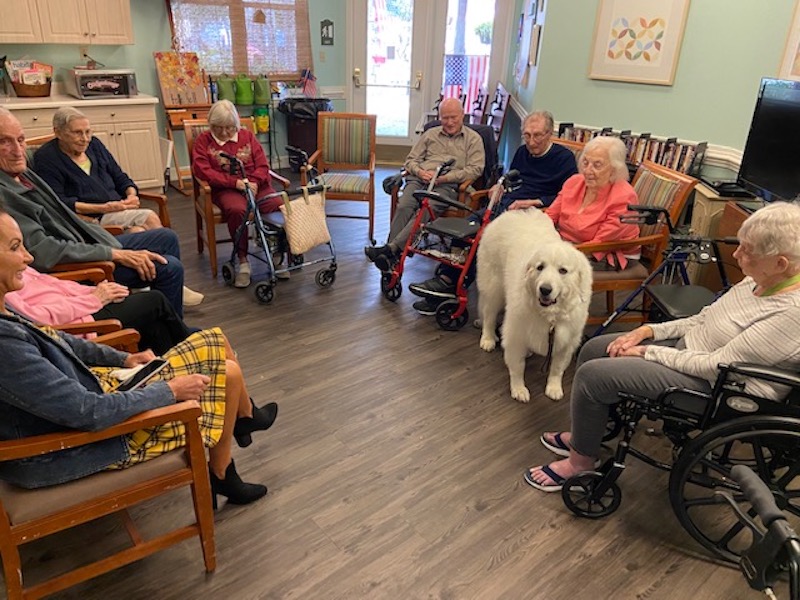
Soon, however, the foster became a permanent home, and Marti gained a rewarding career and became a blessing to lots of Hilton Head seniors. Now Rulli and Marti visit nursing homes, assisted living facilities, and hospice families four days a week.
“Every visit from Martina is like a calming spirit that brings such peace and comfort to everyone,” said Celia Furr, CDP, Memory Care at Preston Health Center.
Marti gets folks to do things they have never been able to do. At the Preston, there are two patients with whom Marti does physical therapy. As stroke victims, they don’t have control of one side of their body, so part of their therapy is to reach out and touch Marti. Rulli explains that sometimes it takes 15 minutes or more for them to raise their arm, but they do it, and usually there are tears all around.
“Her kind eyes do so much to me,” said Beverly, Preston Health Center resident. “I can’t stop petting her.”
“Martina communicates on a level that we humans cannot reach,” said Lori Decicio, RN, Preston Health Center. “It’s a completely and deeply emotional level.”
Visits with Marti provide patients and residents with the opportunity to have physical contact with another living creature, which is crucial since many elders lack physical stimulation and warmth in long-term facilities. Since touch is a basic need that never leaves us, these animals can fill that void without judgement or expectations of reciprocity.
At the nursing homes, the staff will typically assemble the residents in a circle, then Marti will go from person to person and back around again greeting people and allowing them to pet her. “Marti is wonderful with people,” said Jackie Mistler, RN, at Seabrook. “Residents light up when Martina enters the room.”
Dogs are a great antidote for depression; they stimulate positive feelings and may evoke memories and warm thoughts of past pets. Marti’s visits make people feel alive and important rather than alone and forgotten. She can also help those who have pets at home to try to rehab quicker so they can return to their pets.
Recently, Rulli was referred to Christina Colella, The Pines Hilton Head activities director, by a Pines resident who had gone to the Preston for physical rehabilitation where she met Marti. “Fran loved Martina so much that she wanted to see her when she returned home to the Pines,” Colella said. “Martina has brought our residents so much joy and sparked so many memories. They will sit and talk about their memories and how much they love Martina even after she leaves. Having these positive long-term memories helps many residents pull out of their states of withdrawal, isolation, and paranoia. What a blessing Martina is to our residents.”
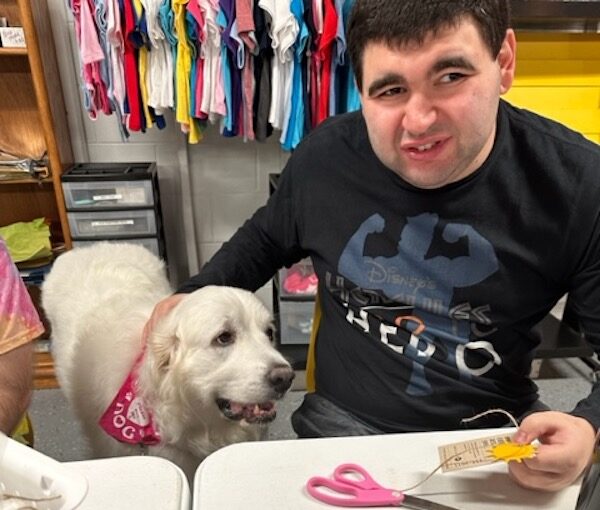
At Pockets Full of Sunshine, two of the special needs adults were deathly afraid of dogs, and it took four or five visits for them to come up and love on Marti. “Marti opens up the people who are afraid of dogs or who can’t respond to outside stimuli,” Rulli said. “The light in their eyes when they see her and reach for her is priceless. Marti brings joy, hope, and smiles to patients that don’t respond to anything else. At Pockets Full of Sunshine, Marti works with folks who can hardly remember anything, but they know Marti’s name.”
Dayna Dehlinger from Pockets Full of Sunshine claims that Marti is often the highlight of the week. “The special adults are drawn to her, and her calming and loving presence brightens all their days,” she said. “She has become part of our Sunshine family.”
While Marti is clearly a favorite wherever she visits, Rulli says that, from Marti’s perspective, it doesn’t really make a bit of difference where they work. As social beings suited to therapy work, therapy animals respond to the love that people bring to the table no matter where they are.
“Marti is truly an asset to the places we visit,” Rulli said. “She provides a natural way to connect, and often provides a transition to deeper conversation. Our work is so richly valuable, and it brings me joy to see her give people comfort when they are at their most vulnerable. Animals, especially dogs, attune readily to human emotions. She is as much my teacher as I am her handler in this journey we share.”
To meet up with Marti or for more information, reach out to Jennifer Rulli at jayru42@hotmail.com,

